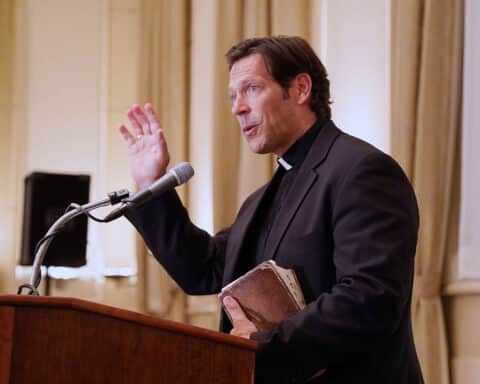
— Joseph Krueger, Divide, Colorado
Answer: Capitalizing pronouns — for example, he, him, his, you, your, etc. — referring to the Blessed Trinity has not been a widespread practice in Christian tradition. In fact, these pronouns are never capitalized in the source documents. They are not capitalized in the Greek text of the Scriptures. Neither did St. Jerome capitalize them when he translated these texts into Latin Vulgate.
Even as the biblical texts were translated into English, the pronouns remained in the lowercase. This is true of both Catholic and Protestant translation of the Bible. The Douay-Rheims Bible did not use them, neither did the King James. Neither do more than 30 current or old translations that I consulted online.
Outside the Scriptures, the English translation of the Catechism of the Council of Trent used lowercase pronouns, as does the current Catechism of the Catholic Church.
Thus, we see the use of the lowercase for pronouns referring to the Divine Persons in biblical text.
Some years ago, at least in English-speaking countries, there was a pious practice of using the uppercase for pronouns referring to members of the Trinity. However, this practice was neither widespread nor ancient.
As for God’s name being holy, this is absolutely true. Thus, Father, Son and Holy Spirit are capitalized, as is the name of Jesus.
But pronouns are not proper names — they are, by definition, words that stand for or point back to proper nouns.
One may well argue that such pronouns should be capitalized, but given the widespread and ancient practice to the contrary, one ought be careful not to impugn motives of impiety for those who do not do so.
Disposing of a Bible
Question: Is there a proper way to dispose of a Bible that is falling apart? It doesn’t seem right to toss it in recycle.
— Joyce Larson, Phoenix, Arizona
Answer: Generally, tattered and unusable Bibles are burned and the ashes are ideally scattered in a garden. Many parishes from time to time burn tattered vestments, sacred books and Bibles, so if you cannot easily burn it, perhaps you can inquire with your parish. Some are shocked at burning sacred things. However, as you point out, it is better than to be in the trash or landfill.
Jesus’ genetics
Question: Since every human child receives half of his chromosomes from his father and half from his mother, where did the Church teach Jesus get the other half of his chromosomes, since he had no earthly father?
— Peter Stein, Everett, Washington
Answer: I am unaware of any official Church teaching in this regard. Knowledge of DNA, etc., is very recent and still deepening. Hence, one would not expect a thorough theological treatise on a matter of this sort now.
However, one principle must surely apply — namely, the teaching from both Scripture and Tradition that Jesus, as a divine person also had a complete, intact human nature and was like us, in this regard in all things but sin.
Hence, he had the complete and proper number of chromosomes. How exactly God supplied the part usually supplied by a human father is not revealed. We are dealing with miracles and mystery.
But this truth remains clear: Jesus, though one person, is fully divine and fully human.
Msgr. Charles Pope is the pastor of Holy Comforter-St. Cyprian in Washington, D.C., and writes for the Archdiocese of Washington, D.C. at blog.adw.org. Send questions to msgrpope@osv.com.





